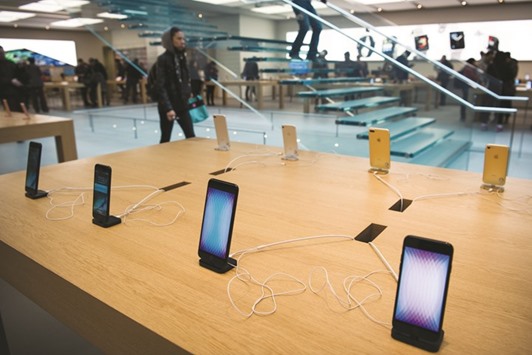It turns out not all iPhone 7s are created equal. The latest Apple smartphones that run on Verizon Communications’ network are technically capable of downloading data faster than those from AT&T. Yet in testing, the two phones perform about the same, according to researchers at Twin Prime and Cellular Insights.
Neither firm is clear on the reason, but Twin Prime says it may be because Apple isn’t using all the potential of a crucial component in the Verizon version.
“The data indicates that the iPhone 7 is not taking advantage of all of Verizon’s network capabilities,” said Gabriel Tavridis, head of product at Twin Prime. “I doubt that Apple is throttling each bit on the Verizon iPhone, but it could have chosen to not enable certain features of the network chip.”
“Every iPhone 7 and iPhone 7 Plus meets or exceeds all of Apple’s wireless performance standards, quality metrics, and reliability testing,” Apple spokeswoman Trudy Muller said. “In all of our rigorous lab tests based on wireless industry standards, in thousands of hours of real-world field testing, and in extensive carrier partner testing, the data shows there is no discernible difference in the wireless performance of any of the models.”
It would be an unusual step for a major phone company to restrain its devices. Normally, companies battle to make the fastest, most reliable handsets. Apple may be doing this because it wants to ensure a uniform iPhone experience, according to analysts.
“They don’t want one version to get the reputation that it is better,” said Jan Dawson, founder of technology advisory firm Jackdaw Research. “If Apple had a guiding principle it’s that they want to make sure customers were having a consistent performance.”
But the move could backfire if customers realise their device isn’t performing to its full potential, or that it’s less capable than other handsets, analysts said.
“This may not impact the fanboys, but it may make other consumers think twice about buying an Apple phone, especially if they think they might be purchasing a sub-standard product,” said Jim McGregor, an analyst at Tirias Research. The firm does paid analysis for smartphone suppliers, including Qualcomm and Intel Corp.
The component at the root of the performance gap is the modem, a tiny chip buried deep inside a phone’s innards that turns wireless signals into data and voice. The iPhone 7 is the first Apple phone for several years to have versions with different modems. Verizon users get an iPhone 7 with Qualcomm’s latest X12 modem - capable of downloading data at up to 600 megabits per second. AT&T customers get a handset with an Intel modem that tops out at 450 megabits per second.
Apple likely went with multiple suppliers to keep component costs in check.
In field tests by Twin Prime, the Verizon version is a little faster than its AT&T stablemate - but not as fast as it could be. The firm proved this by doing the same tests on the Samsung Galaxy S7, which also runs on Verizon’s network and uses the Qualcomm X12. The S7 was about twice as fast as the iPhone 7 running on the same network with the same modem chip, Twin Prime found. This was based on data from more than 100,000 phones downloading an image in large US cities.
Qualcomm’s X12 is capable of dealing with more channels of data simultaneously than its Intel rival, according to a report by Milan Milanovic, an analyst at Cellular Insights, which tests phones and networks. Apple didn’t enable this feature “to level the playing field between Qualcomm and Intel,” Milanovic wrote.
Cellular Insights tests phones in labs with equipment that can vary the strength of the signal, basically approximating a phone moving from good coverage to poor coverage. The differences in performance between the handsets Milanovic tested were greatest when the phone signal was weakest, he said.
Twin Prime and Cellular Insights have no relationships with chip makers, phone makers or wireless carriers. Four other network testing firms contacted by Bloomberg News said measuring phone data speeds is difficult because performance can be influenced by weather and other factors beyond the control of wireless providers and phone makers. Though none of these other firms disputed the findings of Twin Prime and Cellular Insights.
In addition to creating a unified iPhone 7 user experience, levelling the playing field would also keep wireless carriers happy, according to some industry analysts.
“Apple likely has some incentive to balance the performance of its iPhones across its US operator partners,” said Jeff Kvaal, an analyst with Instinet LLC. “It would be difficult, for example, to explain to AT&T, which remains the US carrier with the most iPhone subscribers, why Verizon is offering a superior product.”
Representatives of AT&T, Verizon, Qualcomm and Intel declined to comment.
Companies that “de-feature or go with a less-advanced modem” may be left behind as the networks offer faster data speeds, Qualcomm CEO Steven Mollenkopf said in a recent conference call, without naming specific firms.
Apple is in this situation because it chose different modems for the latest iPhone. By pitting Intel against Qualcomm, the company may be trying to improve its negotiating position on price. Qualcomm’s modems have for years been almost ubiquitous in high-end smartphones, including iPhones. Intel has struggled to break into this market and has used subsidies to try to win share in mobile.

Various iPhones are displayed at a store in New York. The latest Apple smartphones that run on Verizon Communications’ network are technically capable of downloading data faster than those from AT&T. Yet in testing, the two phones perform about the same, according to researchers.
